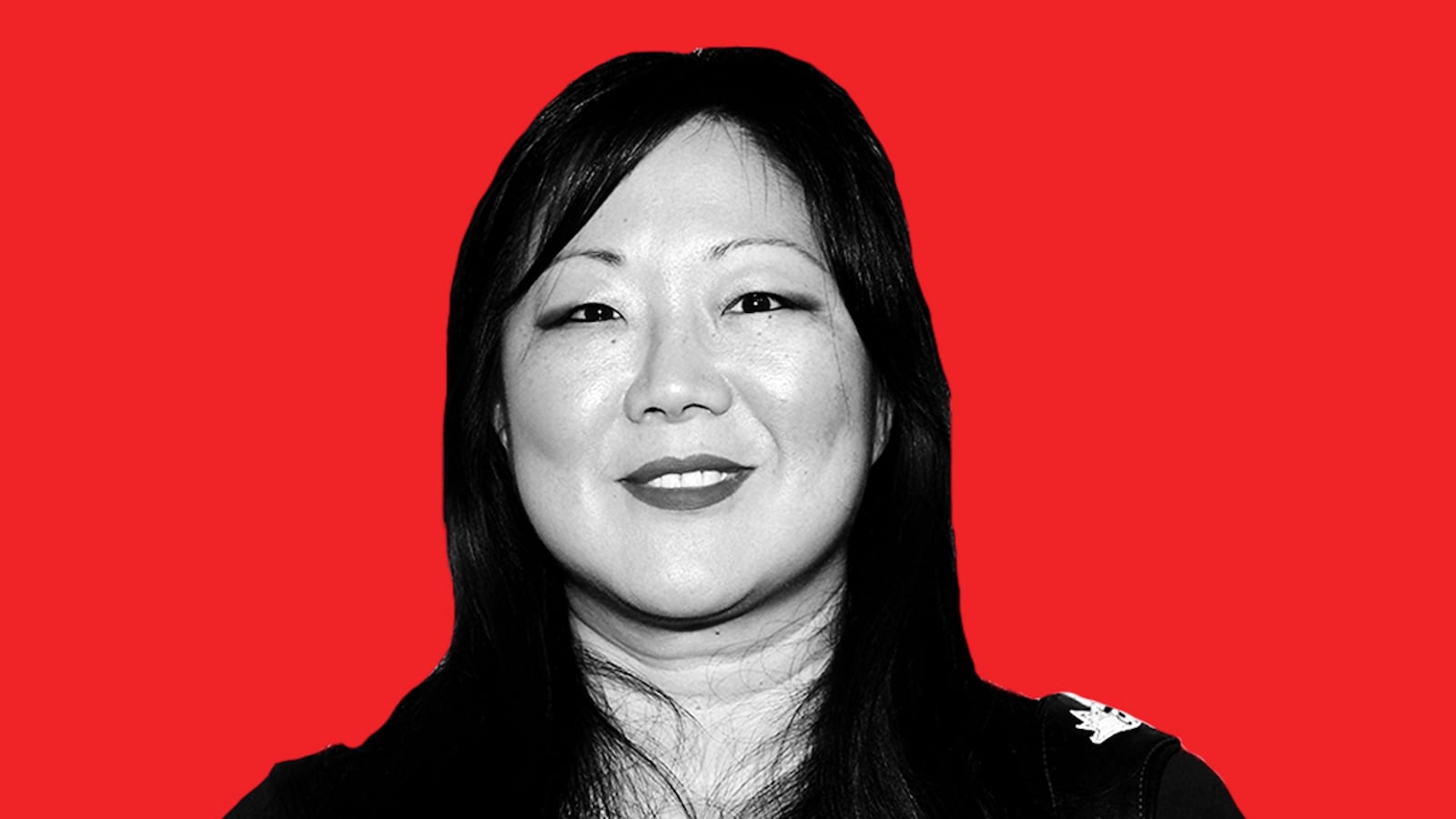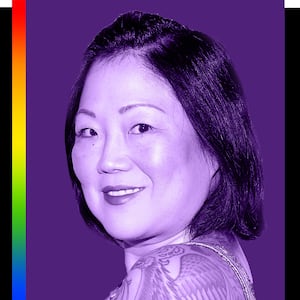Margaret Cho’s tiny chihuahua Lucia makes her presence known exactly once over the course of our hour-long podcast taping, letting out a quick yelp that startles the comedian. “She’s been around media for a long time,” Cho says of her exceptionally well-behaved pet.
Cho, who turned 50 last December, has also been in and out of the spotlight for much of the past three decades, starting with early TV stand-up performances on The Arsenio Hall Show that ultimately led to her starring role in All-American Girl. That show, which premiered on ABC in 1994, ran for just one season and has the distinction of being the first-ever sitcom to focus on an Asian-American family. It took another 20 years for Fresh Off the Boat to become the second.
“I actually appear in the first season. They’re watching me on television, which I think is a great thing,” she says on this week’s episode of The Last Laugh podcast. “I’m really proud of them and I’m so excited that the show has had such a great long life and that all of these stars have emerged from it.”
Asked if she sees more opportunity for Asian-American comedians now than when she was starting out, Cho says, “I think so, I hope so.” But she’s not holding her breath, adding, “I would love to see more and I have seen some more, but I think there’s still some way to go in terms of diversity.”
Unlike Jerry Seinfeld or Ray Romano or the many other (mostly white, male) comedians who got big sitcom deals out of their stand-up acts, Cho did not receive a writing or producing credit on All-American Girl. “They never opened that door for me, I would have had to force it open,” she says. “I just didn’t have the knowledge or capacity to know I should demand that.”
Coming up in the early ‘90s, Cho straddled the club and alternative-comedy worlds, both opening for comics like Seinfeld and Ellen DeGeneres on tour and performing in the back of smoky coffee houses with Janeane Garofolo. “I was a rare breed of comedian who could somehow manage to talk my way into both worlds,” she says. “There was me, maybe Patton Oswalt and not many others who were welcome in stand-up comedy clubs and then also welcome in the alternative spaces.”
These days, Cho is still out on the road performing stand-up shows as well as hosting her own podcast called The Margaret Cho, on which she interviews friends and fellow comedians like Kathy Griffin and her former hair stylist-turned-Queer Eye co-host Jonathan Van Ness from the comfort of her home. “It’s kind of like Whoopi Goldberg’s old talk show,” she says, “way before The View.”
Most recently, she was unveiled as the Poodle on Fox’s semi-dystopian reality-competition show The Masked Singer. Asked why she decided to take that gig, Cho says, “I love singing. And it looked fun to me. And ooh, they give you a lot of money! So it was all of the things that I love.”
Highlights from our conversation are below and you can listen to the whole thing right now by subscribing to The Last Laugh on Apple Podcasts, the Himalaya app or wherever you listen to podcasts.
What she learned from her ‘90s sitcom experience
“It was all very new, this idea of comedians being on television and doing sitcoms. Of course, that led to Roseanne and Tim Allen and quite a few comedians who were headlining their own sitcoms. But it was weird because my comedy was very much geared towards nightclub comedy. I think I was much more raunchy because I was trying to convince audiences that I was older than I was. But when you’re hired by Disney and they brought me into their fold and tried to make a show for me, it was really a strange thing. It was like trying to make a pickle into a cucumber. Now I look back and go, I should have made a deal with HBO and had a lead-in like Arli$$ or Dream On. But I didn’t really know and I had a lot of people who were working with me who were just like, ‘Take the money.’ I just didn’t really get it. But I learned. I think I should have handled things a little bit better, but I also didn’t know who I was as a performer and an artist. Actually, being canceled really helped me become the stand-up comedian that I was supposed to be. So I became a better comedian for it. Maybe if I had had that early success as a TV personality, I wouldn’t have felt the need to go back and develop as a stand-up comedian.”
How Quentin Tarantino ended up on an episode of ‘All-American Girl’
“Quentin and I were dating at probably the craziest time for him, which was in between Reservoir Dogs and Pulp Fiction. He was always around. I don’t know if he had suggested it or we had suggested it, but he wanted to be on an episode of the show. He loves sitcoms. We had both done episodes of Golden Palace—not together, but we had each done episodes of The Golden Girls spinoff. He played an Elvis impersonator. And he’s very appreciative of the multi-cam genre, so he really wanted to be a part of it. At that time, we were hanging out all the time. So the writers pitched it and we did an episode that followed the pattern of Pulp Fiction and had a lot of fun. I’m really appreciative that we did that. It’s so ‘90s. It’s like the most ‘90s thing ever.”
On Dave Chappelle calling bisexuality ‘gross’ on his new Netflix special
“It’s his truth. And I think there is a hidden truth in there. I think there is a lot of prejudice against bisexuals, even within the LGBTQIA community, because bisexuality, sometimes it’s an identity that we claim when we’re not quite ready to be who we are. That is sometimes people’s prejudice to it, because it’s assumed that it’s a lie. Also it’s assumed that it’s convenient, that we can choose. And then it sort of justifies this idea that being gay is a choice, which is something that’s been used against us for so long. So there’s a lot of biases that are hard to put words to because it lends itself to your own homophobia that exists within the queerness that I am. I really try to exempt myself from homophobia but I realize that it exists within me. I welcome the criticism, because I’ve already been through it. It’s the one part of the gay community where they’re kind of like, eh, they could do without us. I don’t think there’s ever going to be a time when I walk away from being bisexual, that I identify solely as a lesbian or solely as heterosexual. But I also don’t think there are two genders, so there are inherently problems with thinking we are binary. There’s no such thing. Everybody is degrees of gender. So there’s a lot of problems with the B.”
On working with John Travolta and Nicolas Cage in ‘Face/Off’
“John Travolta and I would eat lunch in his trailer and one time he ate an entire boysenberry pie, a nine-inch boysenberry pie, with a fork, didn’t even cut it in slices. This is following a Beef Wellington. So I would be doing that same kind of eating. Being in his presence is like being in the presence of a king, so you sort of want to do what he does. I ate so much they had to put an elasticized panel in the back of the suit that I wore. And half of the movie, Nicolas Cage was in character, so he really hated us because we were all in the FBI. If you’re in a movie with Nicolas Cage and you’re not on his side then he’s really shitty to you because he’s in character. So half of it he was really shitty to me. He was kind of mean anyway, but I think it was because of the character. He really yelled at me in one scene. He was just lashing out as his character, which I think is OK. I don’t mind.”
On the backlash to her 2015 North Korean Golden Globes bit
“It was kind of the early days for cancel culture, so I probably would have been canceled if they put words to it. But we hadn’t codified cancelation yet so I got in right before cancelation was a thing. But I didn’t understand, because I am Korean. They were like, ‘How could you portray a Korean?’ I don’t know. And it was mostly white people [who were offended], which was pretty sad. So I think cancel culture doesn’t help us or political correctness doesn’t help us when it serves to try to intimidate you into invisibility. If an Asian person is doing an Asian character, the accent is acceptable. If it’s who you are, it’s kind of OK. It’s very weird when people get agitated about it. But I had fun.”
Next week on The Last Laugh podcast: Stand-up comedian Mike Birbiglia, whose latest show The New One, premieres on Netflix Tuesday, November 26th.


